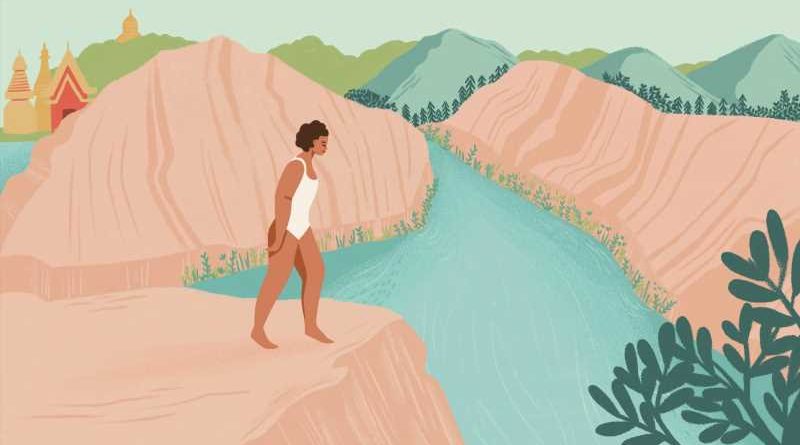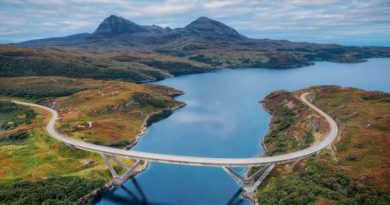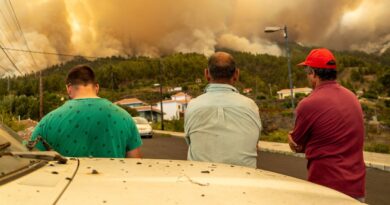Why Saying “No” Can Make Travel More Rewarding
It was in my early 20s, on the edge of a cliff in Northern Thailand, when I first felt the power of a simple yet firm “no.” I was at Chiang Mai’s Grand Canyon, a quarry-turned-swimming hole popular for cliff jumping, and I could hear half a dozen backpackers tittering behind me as they awaited their turns. I, meanwhile, stood petrified at the cliff’s edge.
As I looked down at the glimmering turquoise water down below, my hands getting damp, my heart thudding, it dawned on me that I wasn’t having fun. I felt ill at the thought of jumping. And the only reason I could come up with for doing it was to tell others, later, that I had. I sheepishly turned on my heels to face the line of other travelers, and pushed my way past them. Back down to safety, and back down to my comfort zone.
Travel culture has long been focused on pushing yourself to your limits—taking risks, even. We chase the adrenaline that comes with jumping from planes or hopping on the back of a stranger’s motorcycle. It can even mean something as small as trying an unidentifiable dish despite the fact that you’re a picky eater. The phrase has fallen out of circulation, but it’s the YOLO effect. The peer pressure to always say “yes.” You might be traveling—but are you really a traveler?
With age the internal belief that self-development comes purely from throwing ourselves into the “must-dos” begins to fade—and in its place comes a desire to seek out the things that really nourish us. But even as we grow into people with a better idea of what we do want to do—and what we don’t—there’s still an instinct to go with the flow; to be agreeable, especially as women. When we want to swim against the current, we tend to make apologies for our choices, inconvenient or unexciting as they may be.
I had been freed from the need to follow the crowd.
As with all things in its path, COVID-19 has only amplified this. Over the past ten months, I’ve been confronted with an invite to a destination wedding that, despite the raging pandemic, was going on as planned. I’ve had friends in town over the holidays, hoping to catch up, at a time when I had decided against seeing my own family. I’ve been asked to share an Airbnb in Arizona with people flying in from all over the U.S. while hospitalizations in that state were at an all-time high.
This time around, the stakes are higher than when I stood on that cliff edge. The emotions ran higher too. Telling a longtime friend or family member that I don’t want to do something they want to do is tough—especially when our mental and emotional states hang in the balance. We’re all isolated, travel-starved, and beaten-down daily by turmoil and loss. Nobody wants to hear another “no.”
But that’s why protecting any sense of safety and security I have right now means guarding it with my life. So, I said no to the wedding. I said no to meeting up. I said no to that group trip (ultimately leading to its cancellation altogether, which I’m not losing sleep over). After every conversation, every foot-put-down, I felt a wave of relief. Saying no, every time, was harder than mustering up the “courage” to do something I simply didn’t want to do—and not only because we are in a public health crisis. Each “no” was an affirmation of who I am.
When the world opens up again and I have the luxury of stressing over the mundane, I plan to carry that lesson into the way I travel. I’m going to be pickier about which group trips I join (maybe I would prefer to go with one friend to Santa Fe, than to be with eight people I’ve long fallen out of touch with). I’m going to be selective about the weddings and other obligations that I travel for, with my limited vacation days and limited savings.
And I am definitely not going to bungee jump off a building in Dubai, even though the Internet tells me it’s a “once in a lifetime experience!” Likewise, I will not be diving with sharks simply because I can. Immersing yourself in a new culture, or being faced with perspectives that challenge your own, is, of course, essential to personal growth. But I want to be pushed when I hit the road again in the right ways, and I want to feel safe, and comfortable enough, to enjoy myself in the process.
My retreat from the cliff was humiliating—everyone behind me had to shimmy around on the clifftop for me to get past—but, despite not having jumped, I left with something they didn’t. I had been freed from the need to follow the crowd. The introspection, in that flash second when I decided I didn’t want to jump from a 50-foot-cliff, showed me that I know who I am. Some things just aren’t for me—and that’s okay.
Source: Read Full Article




